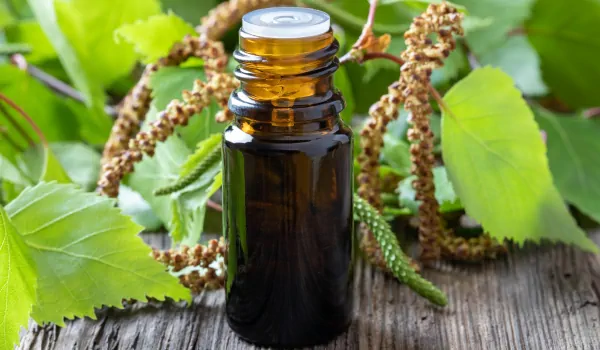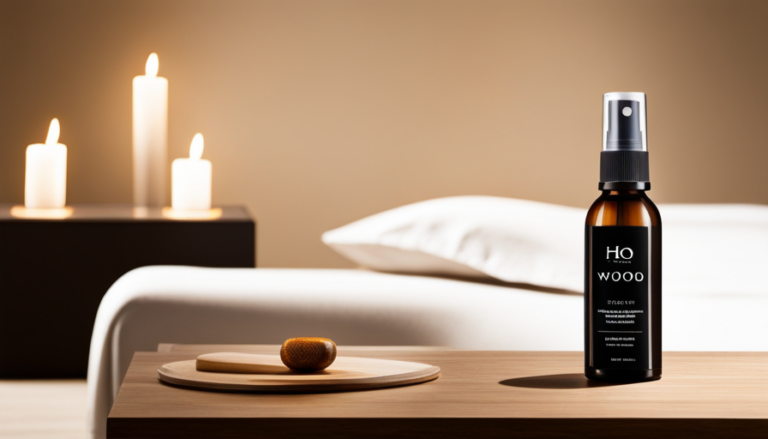Birch Essential Oil Uses: A Comprehensive Guide on How to Benefit from this Powerful Oil

Birch essential oil is a versatile and potent oil that has been used for centuries for its various medicinal properties. It is extracted from the bark of birch trees, specifically the Betula Lenta and Betula Alba species, which belong to the Betulaceae family. This oil is known for its ability to reduce inflammation, alleviate pain, and promote relaxation. Its unique composition makes it a popular ingredient in many natural remedies and products.
Birch essential oil has a long history of use in traditional medicine, particularly in Canada, where it was used by indigenous people for its anti-inflammatory and analgesic properties. Today, it is widely used in aromatherapy, massage, and skincare products due to its many benefits. Its refreshing and invigorating scent also makes it a popular choice for diffusing in the home or workplace to promote a sense of calm and focus.
Whether you’re looking to soothe sore muscles, reduce stress and anxiety, or improve the health of your skin, birch essential oil is a valuable addition to your natural health toolkit. In this article, we will explore the many uses and benefits of birch essential oil, as well as some tips for incorporating it into your daily routine.
What is Birch Essential Oil?
Birch essential oil is derived from the bark of the birch tree, which is native to North America and Europe. The oil has a refreshing and invigorating aroma, making it a popular choice for aromatherapy. It is also used in various skin care products due to its antiseptic and anti-inflammatory properties.
Birch essential oil is one of the many essential oils that have been used for centuries for its medicinal properties. The oil contains various compounds, including salicylic acid and methyl salicylate, which are known for their analgesic and anti-inflammatory properties. These compounds make birch essential oil an effective natural remedy for muscle and joint pain.
In aromatherapy, birch essential oil is used to create a refreshing and stimulating atmosphere. It can be diffused alone or blended with other essential oils such as peppermint, eucalyptus, or lemon. The aroma of birch essential oil is said to help improve mental clarity and boost energy levels.
As a tonic, birch essential oil is believed to have a detoxifying effect on the body. It is said to help eliminate toxins from the body and improve overall health. The oil is also used in various skin care products due to its antiseptic and anti-inflammatory properties. It can help soothe skin irritations and promote healthy skin.
Overall, birch essential oil has a wide range of uses and benefits. Whether you are looking to create a refreshing aroma in your home, relieve muscle and joint pain, or improve your skin health, birch essential oil may be a useful addition to your natural health and wellness routine.
Chemical Composition of Birch Essential Oil
Birch essential oil is extracted from the bark of birch trees. The chemical composition of birch essential oil is complex and includes a variety of compounds such as methyl salicylate, salicylic acid, betulene, betulenol, and germacrene D.
Methyl salicylate is the main component of birch essential oil, accounting for up to 98% of the oil’s composition. It has a characteristic wintergreen aroma and is widely used in the production of perfumes, soaps, and other personal care products.
Salicylic acid is another important component of birch essential oil, accounting for up to 5% of the oil’s composition. It is a natural anti-inflammatory and is commonly used in the treatment of acne, psoriasis, and other skin conditions.
Other compounds found in birch essential oil include betulene and betulenol, which are known for their anti-inflammatory and analgesic properties. Germacrene D is also present in birch essential oil and is a potent anti-inflammatory agent.
Overall, the complex chemical composition of birch essential oil makes it a versatile and valuable ingredient in a variety of personal care and medicinal products. Its unique blend of compounds provides a range of therapeutic benefits, including anti-inflammatory, analgesic, and anti-microbial effects.
| Compound | Percentage |
|---|---|
| Methyl salicylate | Up to 98% |
| Salicylic acid | Up to 5% |
| Betulene | Trace amounts |
| Betulenol | Trace amounts |
| Germacrene D | Trace amounts |
In summary, birch essential oil is a complex mixture of compounds that provide a range of therapeutic benefits. Its high concentration of methyl salicylate and salicylic acid make it a popular ingredient in personal care and medicinal products.
Benefits of Birch Essential Oil
Birch essential oil has a wide range of benefits due to its potent properties. It is known for its ability to improve overall well-being, enhance skin health, support respiratory health, and aid digestion. Additionally, it has detoxifying and refreshing properties, making it a popular choice for aromatherapy.
Aromatherapy Benefits
Birch essential oil is an excellent choice for aromatherapy due to its invigorating and relaxing properties. It can help ease tension and migraines, as well as promote a sense of calm. It can also help reduce fever and act as a febrifuge. When diffused, it can help purify the air and promote a fresh, clean scent.
Topical Benefits
Birch essential oil has analgesic, antispasmodic, anti-inflammatory, antiarthritic, and antirheumatic properties, making it an effective natural remedy for muscle and joint pain, as well as toothaches and skin irritations such as eczema and ringworm. It can also help promote hair growth and reduce the appearance of wrinkles. When used topically, it can act as a skin toner and strengthen gums.
Internal Benefits
Birch essential oil has diuretic properties, which can aid in urination and reduce uric acid levels, making it beneficial for those with gout and urinary tract infections. It can also aid in digestion, improve blood circulation and blood pressure, and assist in the elimination of kidney stones. When used in oral health, it can help alleviate toothaches and promote overall oral health.
Detoxifying Benefits
Birch essential oil has detoxifying properties, which can help eliminate toxins from the body. It also has antibacterial, antifungal, and germicide properties, making it an effective natural disinfectant. It can help protect against bacterial and fungal infections, as well as act as an astringent and tonic.
Other Benefits
Birch essential oil can also help alleviate headaches, dandruff, and congestion. It blends well with other essential oils such as lemon, spearmint, rosemary, and lavender. It can also act as an insecticide, making it an effective natural repellent.
Birch essential oil can be derived from several species of birch trees, including silver birch, black birch, cherry birch, and white birch. It has a fresh, invigorating scent and can be used in a variety of products such as creams, soaps, and ointments.
How to Use Birch Essential Oil
Birch essential oil is a potent extract that has many uses. It can be used topically, aromatically, and internally. Here are some ways to use birch essential oil:
Topically
Birch essential oil can be used topically to help with muscle pain and inflammation. It is important to use a carrier oil such as coconut oil to dilute the birch oil before applying it to the skin. A good ratio is 3-6 drops of birch oil to 30 ml of carrier oil. This will help prevent skin irritation.
Sweet birch oil is the best type of birch oil to use for topical application. It is important to make sure that the oil you are using is Betula lenta (Sweet Birch) and not Betula alba (White Birch) as they have different properties.
Birch essential oil can also be used topically to help with toothache. Simply mix a few drops of birch oil with a carrier oil such as coconut oil and apply it to the affected area.
Aromatically
Birch essential oil can be used aromatically to help with fatigue, sore joints, and muscle pain. To use birch oil aromatically, simply diffuse it in a diffuser or add a few drops to a diffuser blend.
Aromatherapy with birch essential oil can also help improve your mood and promote relaxation. The aroma of birch oil is fresh, clean, and uplifting.
Internally
Birch essential oil can be taken internally to help with inflammation and pain. It is important to use a high-quality, food-grade oil and to follow the recommended dosage.
Birch essential oil should not be taken internally by pregnant or breastfeeding women or by children without the guidance of a healthcare professional.
In conclusion, birch essential oil has many uses and can be used topically, aromatically, and internally. When using birch oil, it is important to dilute it with a carrier oil, use a diffuser for aromatherapy, and follow the recommended dosage for internal use.
Side Effects and Precautions
Before using birch essential oil, it is important to be aware of its potential side effects and take necessary precautions.
Pregnancy and Breastfeeding
Pregnant and breastfeeding women should avoid using birch essential oil as there is not enough scientific evidence to support its safety during these periods. It is best to consult with a healthcare provider before using this oil.
Skin Irritation
Birch essential oil is a potent oil and may cause skin irritation if used undiluted. It is recommended to always dilute it with a carrier oil before applying it to the skin. Conduct a patch test before using it to check for any allergic reactions.
Internal Use
Birch essential oil should not be ingested as it can be toxic and cause serious health problems. It is only meant for external use.
Other Side Effects
Some people may experience side effects such as headache, nausea, vomiting, dizziness, and seizures after using birch essential oil. It is important to discontinue use if any of these symptoms occur and seek medical attention if necessary.
Precautions
To ensure safe use of birch essential oil, follow these precautions:
- Keep out of reach of children.
- Do not use on open wounds or broken skin.
- Avoid contact with eyes and mucous membranes.
- Store in a cool, dry place away from direct sunlight.
In conclusion, while birch essential oil has many potential benefits, it is important to be aware of its potential side effects and take necessary precautions before using it. Pregnant and breastfeeding women should avoid using it, and it should always be diluted before applying to the skin. If any adverse reactions occur, discontinue use and seek medical attention if necessary.
Conclusion
In conclusion, birch essential oil has numerous benefits that make it a popular choice for aromatherapy and natural medicine. Its invigorating scent and antimicrobial properties make it an excellent choice for diffusing in the home, while its antiarthritic and expectorant properties make it useful for treating a variety of ailments.
Studies have shown that betula pendula, the species of birch tree from which birch essential oil is derived, contains compounds that have anti-inflammatory and pain-relieving effects, making it a useful choice for those suffering from joint pain or muscle soreness.
When using birch essential oil, it is important to dilute it with a carrier oil before applying it topically, as it can be irritating to the skin in its pure form. It is also important to note that birch essential oil should not be ingested, as it can be toxic in large doses.
Overall, birch essential oil is a versatile and beneficial oil that can be used in a variety of ways to improve overall health and well-being. Whether diffused in the home, applied topically, or used in massage oils, it is a valuable addition to any natural medicine cabinet.






